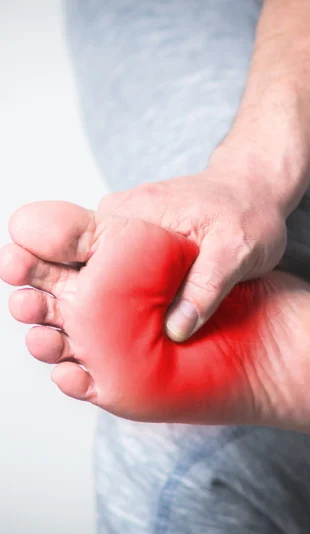Get Free Consultation
8:30AM - 6:30PM
Get Free Consultation
8:30AM - 6:30PM
-Have you ever woken up in the morning only to experience a sharp pain near the heel? The pain is further triggered by standing or sitting for a prolonged period of time. This pain in the heel is one of the most common symptoms of Plantar Fasciitis. Several factors cause this condition to develop. Some of them are age, specific exercises, foot mechanics, obesity, etc. No matter what the cause is, physiotherapy can help you manage the condition. In fact, consistent physiotherapy sessions can help you regain an optimal lifestyle.
Let’s understand what plantar fascia is first before digging deeper into Plantar Fasciitis. The plantar fascia is a thick ligament that forms a connection between your heel and the front of the foot. It helps the foot absorb shock and supports its arch. All in all, the plantar fascia helps you walk or rather move around. It is needless to say how critical the plantar fascia is for movement. Thus, it goes through a great deal of wear and tear. At times, excessive strain on the feet can damage your ligaments. It can lead to the inflammation of the plantar fascia causing excruciating pain and stiffness in the heel.


A sharp pain in the bottom of the heel is the most common symptom of plantar fasciitis. You may however feel the following as well:
The pain develops gradually. Also, it is at its worst when you take the first few steps right after waking up. You may find it hard to climb stairs in that pain.

The exact cause of this condition is yet to be found. However, the most common reason is excessive stress or overuse of the plantar fascia.
Here are common scenarios that can cause plantar fasciitis:
A licensed physiotherapist is the right professional to help you figure out the main cause of the condition in your case. You should see one as soon as you experience the symptoms of plantar fasciitis.
Physiotherapy has amazing effects on the condition. The pain reduces. You get your mobility back with time. Overall, you feel healthy after a few physiotherapy sessions.
There are multiple options in physiotherapy for the treatment of plantar fasciitis. Some of them are:

According to research, manual therapy has shown good results in the treatment of plantar fasciitis. Thus, the physiotherapist prepares an exercise routine for you depending on the severity of your condition.

Electrotherapy is a great alternative to surgeries and medicines when it comes to treating chronic heel pain. It reduces inflammation of the tissue reducing pain significantly.

You will notice two things if you are suffering from the plantar fascia. One, the plantar fascia is abnormally stiff. Two, the intrinsic muscles of the foot have become weak. The physiotherapist prescribes specific strengthening and stretching exercises to treat the problems.
All in all, physiotherapy can help you manage the condition efficiently and without any surgery. All you have to do is identify the symptoms of the condition as early as possible. Then consult with reliable physiotherapists like the ones at Townline Physiotherapy for an effective recovery plan.